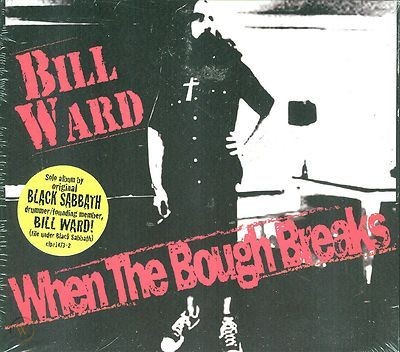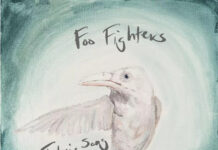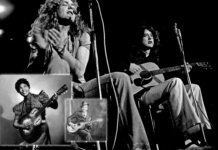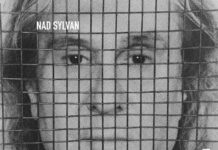Legendary drummer Bill Ward (ex-Black Sabbath) released an overlooked gem of an album back in 1997 entitled When the Bough Breaks, and I figured that a short, concise celebration of it was in perfectly good order given that the record is an incredibly varied and deftly executed affair that warrants repeated listens and retains its pulling power from beginning to end. The LP covers quite a bit of musical ground and classifying this eclectic collection of songs is no easy task. Nevertheless, we shall do our best to provide those of you who are unfamiliar with it a glimpse of the greatness and vigour that it contains.
I distinctly recall the day that I stumbled on the CD, which was in Aarhus (Denmark) back in 2005. It was a 3-dollar sale, and I was ecstatic when I discovered it in a huge pile of assorted discs that otherwise held absolutely no interest to me. The album was something that I had read about in a couple of books and articles previously but never actually listened to, which is to say that I was not really sure what to expect when I came home that day and popped it into the player. Thankfully, I was pleasantly surprised at how original and spirited it came across. What undoubtedly shocked some fans and listeners (me included) was that Bill did not play the drums on the disc but instead had Ronnie Ciago handle percussive duties. The rest of the line-up was comprised of Paul III (bass), Keith Lynch (guitars), and Spencer Sercombe (keyboards) while Peter E. Kelsey was in charge of the production.
There are several phenomenal compositions to be discovered here, but rather than dissecting the whole thing, let us merely discuss a few of the standout cuts below, which will hopefully spark curiosity in you, the reader, with respect to what the rest of the material is like. The opening track ‘Hate’ is an instantly memorable one that features excellent vocals by Ward, gorgeous layers of melodies and a tinge of soul and gospel. The Beatles-influenced ‘Children Killing Children’ is a gentle, well-composed piece that harbours a lot of emotion while ‘Growth’ and ‘When I Was a Child’ conjure up a sense of yearning and nostalgia. ‘Please Help Mommy (She’s a Junkie)’ is rather bleak from a lyrical perspective, yet the song appears strangely uplifting, which spawns an interesting dichotomy within it. Incidentally, it is also one of the heaviest pieces to be found on the disc.
The exotic vibes of ‘Animals’ are enticing, and its main riff is heavy in an understated way and works in perfect tandem with the almost tribal rhythms of the drums that propel the track forward. It possesses a hypnotic, trance-like vibe that makes it the album’s highlight to these ears. Other noteworthy tracks include ‘Nighthawks Stars and Pines’ and ‘Try Life,’ and in the words of editor and journalist Dave Everley, When the Bough Breaks features the killer one-two of stellar soul-tinged ballad Nighthawks Stars & Pines and the Lennon-esque Try Life, which stands shoulder to shoulder with anything any of his Sabbath bandmates have recorded away from the band.
“It was about being sober and coming through the darkness of myself and into a different life,” Ward says of the latter song. “That’s not always been an easy task. But I’ve managed it.” (Classic Rock, 2022)
An interesting thing about the album is that it came with two different artworks and layouts, which is to say that two different versions were released. One depicted two red roses on the cover while the other sported a photo of Bill from one of Black Sabbath’s tours in the 70s. Speaking of which, When the Bough Breaks bears no resemblance to the mighty Sabbath as such. The two songs that Ward did the vocals for back in the late 70s, namely ‘It’s Alright’ from Technical Ecstasy (1976) and ‘Swinging the Chain’ from Never Say Die (1978), could arguably be compared ever so slightly to some of the material contained within the grooves of When the Bough Breaks, but that primarily comes down to the vocal phrasing and melodies in a few places. On second thought, perhaps ‘Children Killing Children’ is not miles apart from ‘It’s Alright’ after all?
The frustrating thing about Ward’s solo outputs is that they are not merely overlooked and underappreciated but also victims to lack of promotion. As Joel McIver states in Sabbath Bloody Sabbath, Ward had also released his own work – a debut album in 1990 entitled Along the Way (which rapidly went out of print) and a more fully rounded work in 1997 called When the Bough Breaks. Both records featured Bill’s competent vocals, a professional production and useful performances from lesser-known musicians, but both vanished more or less without trace despite being released by a reasonably well-known label, Cleopatra. (274)
When the latter record was released in late April of 1997, the Black Sabbath reunion completely overshadowed both Ward’s solo offering and that of Geezer Butler, i.e. the hard-hitting slice of industrial metal madness that is Black Science, which is perhaps not surprising considering the appeal of the Sabbath reunion but frustrating nonetheless as Bill and Geezer’s respective works deserved better.
As author Garry Sharpe-Young pointed out in his comprehensive study titled Sabbath Bloody Sabbath: The Battle for Black Sabbath, the reunion was obviously a monumental event that seemed to eclipse everything else including some of the members’ solo careers and creative endeavours:
For 1997’s ‘When the Bough Breaks’, which saw Ward handling lead vocals, his band comprised guitarists Keith Lynch and Spencer Sercombe, former Ear Slick bassist Paul III and ex-Riverdogs drummer Ronnie Ciago . . . this album came with two versions of sleeve art, the first with a rose design and the second with an archive picture of Bill. Whilst ‘Black Science’ was an undoubted musical triumph for Butler and ‘When the Bough Breaks’ had rekindled interest in Ward’s activities, the reunion leviathan jaws were awning and personal projects were cast aside. There would be bigger fish to fry. (283)
All three albums by Bill are worth exploring and immersing oneself in, but if pressed at gunpoint I would say that When the Bough Breaks is Ward’s crowning achievement outside of Black Sabbath; he wrote all the music and lyrics and also handled the arrangements. There is something about those melancholy lyrics and his warm, soothing voice that gets me every time. Hauntingly beautiful, deeply poetic, and a stately piece of work is exactly what this is.
When the Bough Breaks was released by Purple Pyramid Records in April 1997.
Tracklist:
- Hate
- Children Killing Children
- Growth
- When I Was a Child
- Please Help Mommy (She’s a Junkie)
- Shine
- Step Lightly
- Love and Innocence
- Animals
- Nighthawks Stars and Pines
- Try Life
- When the Bough Breaks
Works cited:
Everly, Dave. “Bill Ward has made a masterpiece and no one wants to release it”, Classic Rock, published June 30, 2022, https://www.loudersound.com/features/bill-ward-has-made-a-masterpiece-and-no-one-wants-to-release-it, accessed online January 8, 2023.
McIver, Joel. Sabbath Bloody Sabbath. Omnibus Press, 2011.
Sharpe-Young, Gar. Sabbath Bloody Sabbath – The Battle for Black Sabbath. Zonda Books, 2006.
Link: https://www.billward.com/discography/when-the-bough-breaks/





















